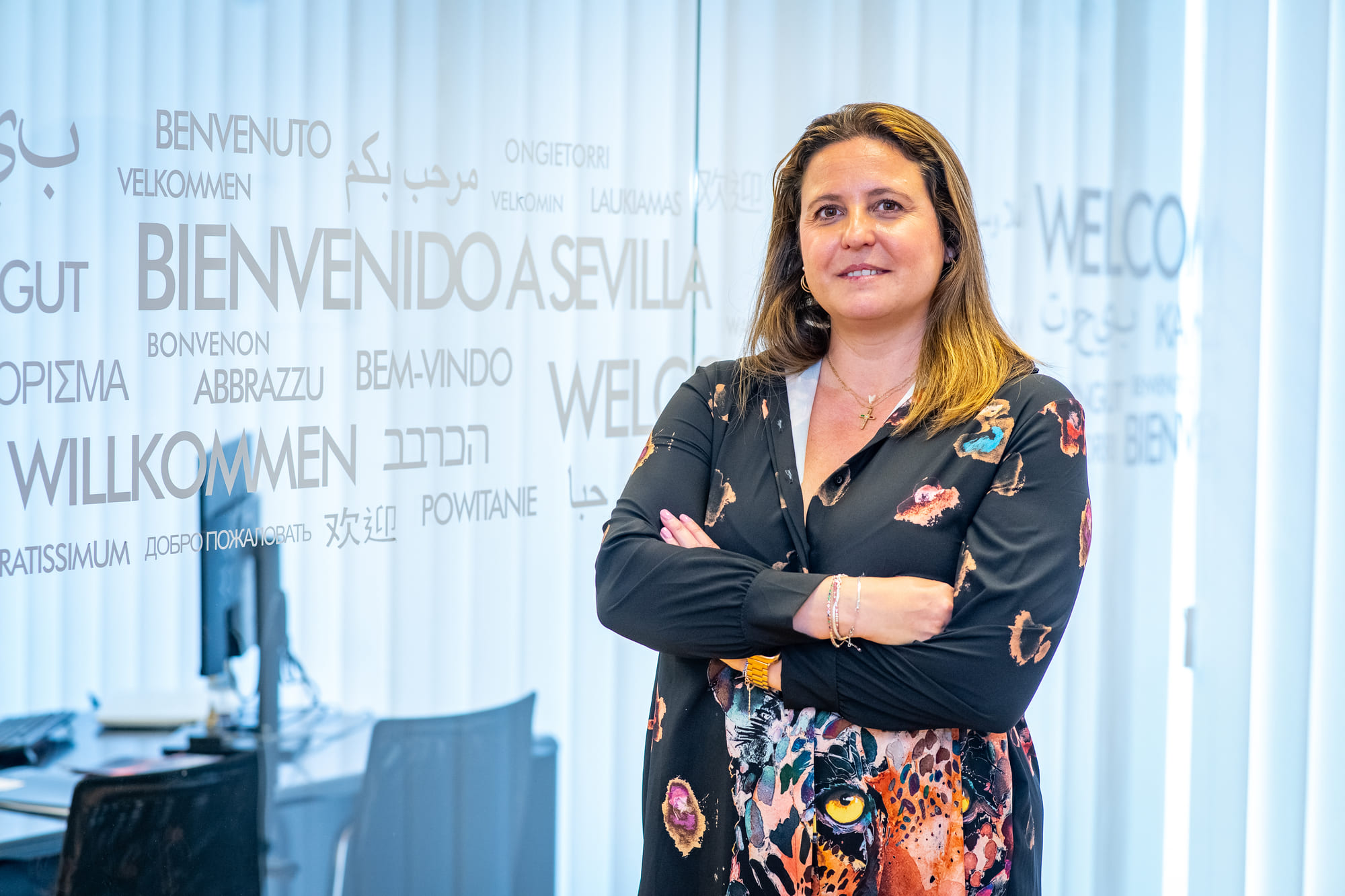Estás leyendo
“We must continue to seek sustainable, accessible, digitalised and creative tourism in order to remain competent in the tourism market”
Compartir

TIS hopes to once again turn Seville into the epicentre of tourism innovation. A meeting that will bring together thousands of professionals and experts from the sector in a new space, such as FIbes I. On this occasion, we spoke to the delegate for tourism, Angie Moreno, about the impact of this meeting on the city, and its role as an economic engine for tourism.
“‘Sharing is Smart’, Seville must share to continue growing as a tourist destination”
Question: What does holding an event like the Tourism Innovation Summit (for the fourth time) tell us about a city like Seville?
Angie Moreno: The TIS has already become a benchmark event for the city and does nothing more than demonstrate Seville’s firm commitment to the development of a sustainable and intelligent tourism model; a path that has already taken its first steps with the Smart Tourism Office project and which has helped us to obtain recognition as European Capital of Intelligent Tourism.
This event allows us to address the challenges facing the tourism sector from the hand of great professionals and experts, and the keys to boost the industry in the most intelligent, digital, innovative and sustainable way possible.
Q: What impact has TIS 2023 had on the city?
A.M: The impact of this edition of TIS has been very positive for Seville, which has become the leading epicentre of world tourism with the presence of 43 international delegations from countries such as Mexico, Ecuador, France, Portugal, Turkey, the United States, China, South Africa, Norway, the United Kingdom, France, Italy, Greece, Norway, Canada, Argentina and Slovenia.
We have had more than 10,000 square metres of exhibition area in which more than 200 exhibitor companies have presented their new products. In addition, this edition brought together a total of more than 7,000 industry congress participants together with 400 international experts. Finally, TIS 2023 has had an economic impact on the city of more than 20 million euros.
Q: What lessons can the sector learn from Seville as a tourist destination?
A.M: As the slogan that has led us to become European Capital of Smart Tourism in 2023, ‘Sharing is Smart’, says, Seville must share in order to continue growing as a tourist destination. Soak up experiences and take note of the actions being carried out by other destinations that can be positive for our city. This is one of the main reasons why TIS is held, a meeting point in which to establish synergies with other destinations, share projects and look to the future.
In this edition we have met important projects from Mexico, the guest country on this occasion, with the Monterrey Tourism Cluster, a successful model of cooperation between the public and private sectors; or China, which has put the focus on adapting the offer to the travel habits of each culture. We must know how to grasp all the ideas that are proposed and apply everything that can be useful for the evolution and growth of the sector.

“Nowadays people are looking for an experience rather than just a stay”
Q: What are the trends that will most transform tourism in the coming years?
A.M: We live in an increasingly digital era in which innovation must be constant in order not to be left behind. Tools such as artificial intelligence, cybersecurity, big data, business intelligence and hotel tech will help us to have a more intelligent, sustainable tourism and, above all, to know the reality of the sector, both on a professional and personal level; in other words, to know what tourists are looking for when they visit a destination and to be able to offer them as complete an offer as possible, as nowadays they are looking for an experience rather than just a stay.
Q: How does Seville position itself in relation to each of these (where are its strengths)?
A.M: Seville must continue on the path that has led it to become Smart Tourism Capital in 2023. It must continue to seek sustainable, accessible, digitalised and creative tourism in order to remain competent in the tourism market.
For example, in this edition of TIS we have presented a very ambitious and important project of the Smart Tourism Office, thanks to the collaboration of ASET and the Pablo de Olavide University, which is the Global Index of Tourism Activity. This is a measurement parameter that will allow a comprehensive assessment of tourism activity and its sustainability from a global and comprehensive point of view in the short term. The IGAT will help us to know the reality from which we start and its results will be essential when it comes to making decisions for administrations, public managers and even citizens.
Q: We are in the midst of a process of recovery and transformation of the tourism sector, how do you envisage the future in Seville and Andalusia (the idea would be to obtain some kind of forecast of the sector’s weight in the local economy as a whole, for example)?
A.M: At present, tourism is the driving force behind Seville’s economy; it is its main industry. In the specific case of Seville, we are talking about 19 percent of GDP directly, and almost 25 percent indirectly.
Looking to the future, we must continue to take care of this powerful industry from a strategic point of view, in order to face the challenges that lie ahead and which are translated into 3 lines of action that will improve the quality of tourism:
The SIT (Tourism Intelligence System) tourism database developed by the Smart Tourism Office is our foundation. Its data will increasingly help stakeholders and relevant businesses to provide optimised offers, to collect data for sustainable tourism management and ultimately to become more competitive.
Ultimately, meeting diverse needs to enable greater inclusion, which not only enhances the tourism experience, but also solidifies the reputation of our cities as inclusive and welcoming destinations.
This data-driven approach will allow the city to anticipate and make informed decisions to mitigate the negative social impacts of tourism, such as implementing crowd control measures, controlling irregularities, accommodation, noise regulation, thus ensuring a more sustainable and harmonious coexistence between tourists and residents.
The destination’s tourism management policies are already driving the growth and strengthening of the destination’s economy. By optimising resource allocation, managing visitor flows, and reducing environmental impacts, Seville has minimised pressure on its infrastructure, natural resources and local communities, but this is a long-distance race.

This website uses cookies so that we can provide you with the best user experience possible. Cookie information is stored in your browser and performs functions such as recognising you when you return to our website and helping our team to understand which sections of the website you find most interesting and useful.
Strictly Necessary Cookie should be enabled at all times so that we can save your preferences for cookie settings.
If you disable this cookie, we will not be able to save your preferences. This means that every time you visit this website you will need to enable or disable cookies again.
This website uses Google Analytics to collect anonymous information such as the number of visitors to the site, and the most popular pages.
Keeping this cookie enabled helps us to improve our website.
Please enable Strictly Necessary Cookies first so that we can save your preferences!